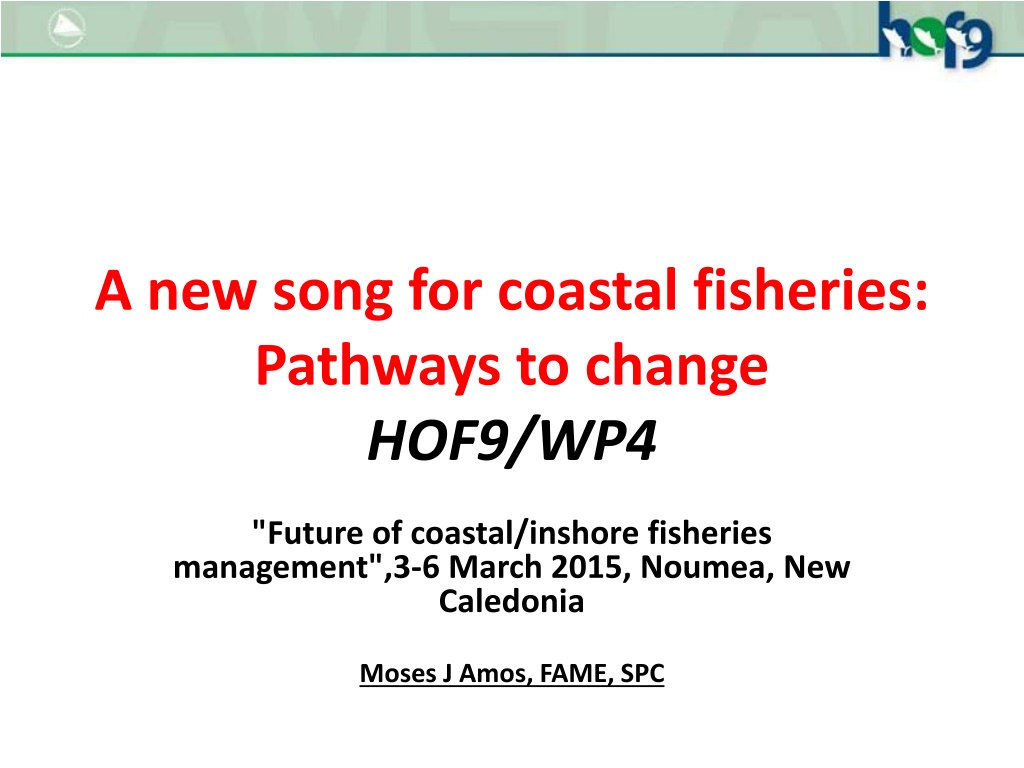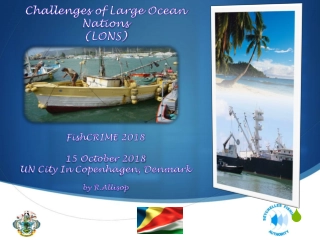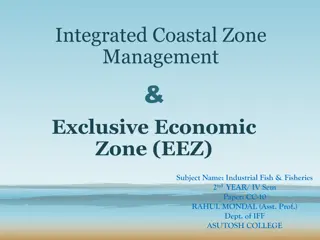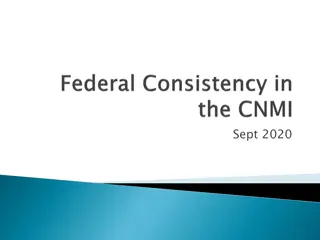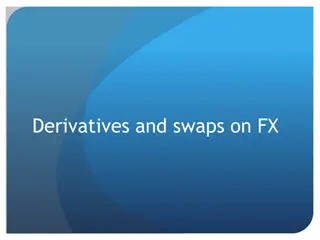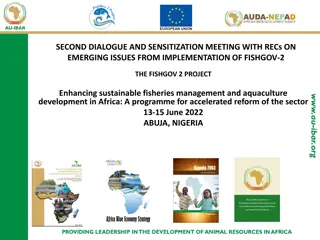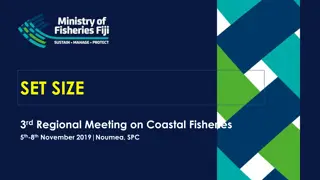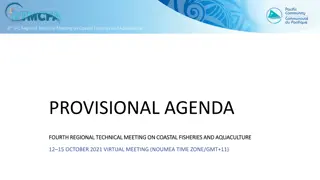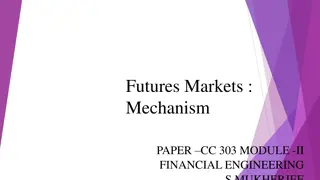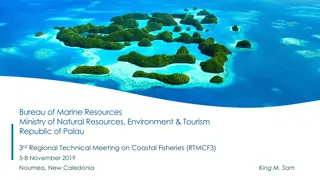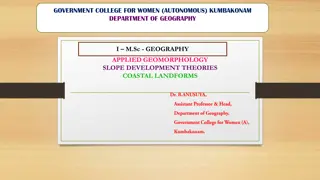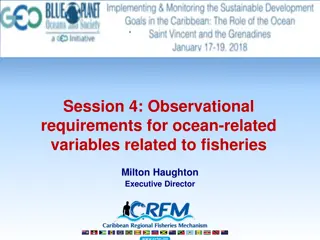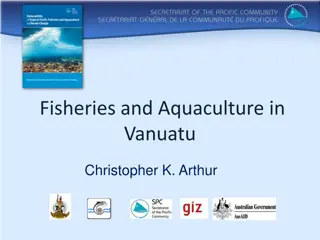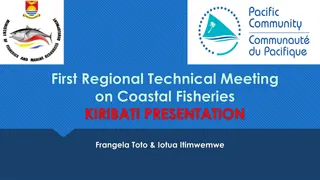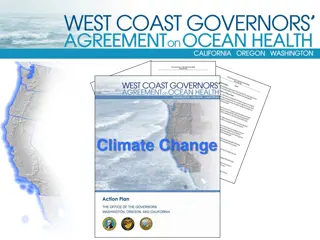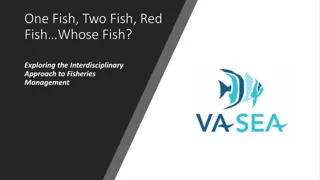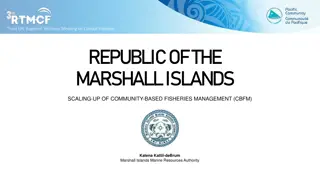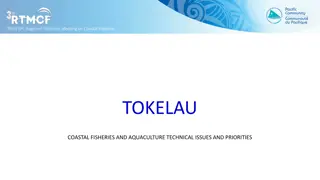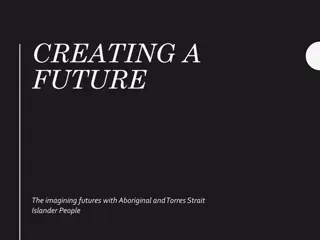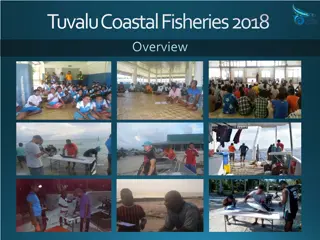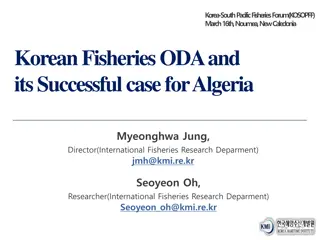Transforming Coastal Fisheries Management for Sustainable Futures
Workshop held in Noumea, New Caledonia in 2015 focused on the challenges and opportunities in coastal fisheries management. Key issues include livelihoods, food security, and the need for ecosystem-based approaches. Success stories highlight the importance of community involvement. The workshop called for a shift towards a new management approach building on existing regional frameworks to support food security and sustainable livelihoods.
Download Presentation

Please find below an Image/Link to download the presentation.
The content on the website is provided AS IS for your information and personal use only. It may not be sold, licensed, or shared on other websites without obtaining consent from the author. Download presentation by click this link. If you encounter any issues during the download, it is possible that the publisher has removed the file from their server.
E N D
Presentation Transcript
A new song for coastal fisheries: Pathways to change HOF9/WP4 "Future of coastal/inshore fisheries management",3-6 March 2015, Noumea, New Caledonia Moses J Amos, FAME, SPC
Overview of process Convened 3-6 March 2015 with funding support from the Australia Government (DFAT), in collaboration with ACIAR, ANCORS, WorldFish, LMMA, and SPC/CPS, facilitated by Dr. Ian Cartwright A wide range of stakeholders represented; fisheries and environment departments communities NGOs CBFM specialists regional agencies Series of plenary and working group (Melanesia, Micronesia, Polynesia, & NGO) sessions Impressive and extensive outputs, these are available on the SPC web, including the: outcomes document (WP4) a summary record of the key issues raised, presentations and outcomes of working groups
Re-cap Unlike the industrial tuna fishery, there is no regional approach to coastal fisheries management. Failure of the management techniques has resulted in closing down of fisheries to prevent collapse of the resource Production will not expand in future. Growing populations : - declining coastal fisheries resources in many countries The situation will become worse in the future
Key Challenges Livelihoods Inshore fisheries provide the primary or secondary source of income for up to 50% households 50-90% of animal-sourced protein comes from fish Forecasted food gap of 115,000 tonnes by 2030
Key Challenges Food Security Gap Assume a whole snapper: 25-30 cm or around 250g Plate size fish Fish gap within 15 years 115,000 metric t of Coastal fish 460,000,000 pieces of coastal fish
Success stories It is about managing communities and fishers rather than fish role of communities via CEAFM crucial Emphasis on an ecosystem/social system approach Many good, but isolated examples of successful CBFM
Outcomes of the workshop Challenge faced by the new approach is to upscale to sub-national and national levels We need to change the way we have been addressing coastal fisheries management that builds on existing regional frameworks: The Vava'u Declaration in 2007 - calls for effective management of coastal fisheries to support food security and sustainable livelihoods The Apia Policy - forged to help harness the benefits of coastal fisheries The Joint FFA/SPC Future of Fisheries Report The IUCN call for action, FAME Strategic Plan The outcomes from the SIDS Conference The MSG Roadmap The Framework for the Pacific Oceanscape The 2014 Palau Declaration on The Ocean: Life and Future
The New Approach - A new song for coastal fisheries: Pathways to change The workshop was clear that a new and innovative approach to dealing with declines in coastal fisheries resources and related ecosystems is needed. Simply put, more of the same won t do and a new song for change is needed.
New song for Pathways to Change At the regional level, the approach aims to bring together disconnected initiatives and stakeholders into a strong, coordinated approach with a shared vision of coastal fisheries management. At the national and sub-national level, the approach requires political recognition of the value of coastal fisheries to food security and rural development and a related commitment to resource the sector.
New song for Pathways to Change A new Song for change from business as usual for Coastal fisheries management is urgently needed The new Song must be sang in harmony by all stakeholders from the same song book.
National, Sub-regional, & Regional Partnerships - The New song for Pathways to Change Coordinated approach regional and s/regional agencies with a shared vision of coastal fisheries management Coordinated approach between regional and national/sub-national with a shared vision of coastal fisheries management REGIONAL (Agencies & NGOs) CFM incorporating CEAFM scaled up to meet domestic Dev. aspirations NATIONAL & SUB - NATIONAL SUBREGIONAL Coordinated approach between s/regional and national/sub-national with a shared vision of coastal fisheries management (Agencies & NGOs)
Vision New song for Pathways to Change Sustainable well managed inshore fisheries, underpinned by community based approaches that provide food security, long-term economic, social, and ecological benefits to our communities
The Barriers to effective Coastal Fisheries Management The workshop identified 11 key barriers that must be overcome if effective coastal fisheries management is to be implemented at a useful scale in the region. Geographical isolation, the extent of coastlines and the diversity of coastal communities. Lack of political profile, will and support in advancing CEAFM, including services delivered at the sub-national level. Inadequate focus on coastal fisheries management by fisheries agencies compared to the offshore tuna sector, with limited capacity and resources being applied to coastal fisheries management. Outdated management policy, legislation and planning, with little or no monitoring of effectiveness or sustainability. Lack of relevant data, analysis and knowledge to inform management at all levels. Inadequate empowerment of local communities and links with sub-national government. Poor stakeholder collaboration/connection at the national level and regional level. Inadequate compliance with fisheries rules and variable/inadequate sanctions. Lack of integration of CEAFM into national economic policy and strategies. Failure to adequately recognize the crucial role women play in the management and sustainable use of inshore fisheries resources. Limited alternative livelihoods and lack of available commercial funding mechanisms to support small-scale community livelihoods.
New song for Pathways to Change Overarching Outcomes 1. Improved wellbeing of coastal communities 2. Productive and healthy ecosystems and fish stocks
New song for Pathways to Change 8 sub outcome statements developed and agreed Informed, empowered coastal communities with clearly defined user rights Adequate information to inform management and policy Recognition of, and strong political support for coastal fisheries management at a national and sub-national scale Re-focused fisheries agencies that are transparent, accountable, and adequately resourced, supporting coastal fisheries management underpinned by CEAFM Strong and up-to-date management policy, legislation and planning Effective collaboration and coordination between stakeholders and key sectors of influence More equitable distribution of benefits and decision making within communities, including women and youth Diverse livelihoods reducing pressure on fisheries resources, enhancing community incomes, and contributing to improved fisheries management
Monitoring and evaluation of the New song for Pathways to Change If the New Song is to be effective, it is vital to monitor progress and identify and address critical issues in a timely manner against the indicators Monitoring of the New Song will provide an opportunity for the region to report to Leaders on coastal fisheries, including under the FFA/SPC Future of Fisheries initiative. The implementation of an effective monitoring and evaluation framework will be key task for the SPC Fisheries Aquaculture and Marine Ecosystems Divisions (SPC FAME) as implementation of the New Song progresses.
Where to: from last Friday It is recommended that HOF9 consider and endorse the New Approach - A new song for coastal fisheries: Pathways to change outlined on HOF9/WP4 (any final inputs or comments from HoF can be included where appropriate by the Secretariat) https://encrypted-tbn0.gstatic.com/images?q=tbn:ANd9GcR8zWxjZ5OkqsXLhLECnBDAgTUwmJM_ZouZg3wwtZ84kBGbgEDe
Next Steps The SPC will progress endorsement of the New Song through relevant regional forums in a sequenced and logical fashion. New SONG FFC Official, (May) HOF9 FFC MIN, (July) SPC MIN CRGA (Nov) PIF/POC PIF LEADERS
Thank you Merci
